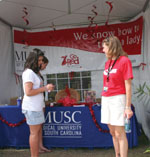
Return to Main Menu
|
MUSC supports Ginn Tribute Hosted by
Annika tourney
by Cindy
Abole
Public
Relations
Red was the color of the day among Ladies Professional Golf Association
(LPGA) players, officials, volunteers and spectators on June 1 to
support women’s heart disease awareness at the inaugural Ginn Tribute
Hosted by Annika event, May 31 - June 3 at RiverTowne Country
Club.
 MUSC’s presence at
the inaugural Ginn Tribute tournament featured a Go Red for Women booth
that offered heart health information, giveaways, goodies and prize
drawings. Throughout the event, Business Development and Marketing
Services’ Kim Haynes (right) and employees staffed the booth and met
visitors. MUSC’s presence at
the inaugural Ginn Tribute tournament featured a Go Red for Women booth
that offered heart health information, giveaways, goodies and prize
drawings. Throughout the event, Business Development and Marketing
Services’ Kim Haynes (right) and employees staffed the booth and met
visitors.
Heart disease is the leading cause of death among American adults. The
Go Red for Women campaign and red dress symbol are all part of a
national movement to remind women to protect their heart health and
inspire others to unite in this cause that saves lives. Hundreds of
tournament participants wore red clothing, accessories, or “Go Red for
Women” red wristbands and hair ribbons to support this universal
message.
“In an event like this, our hope is to draw attention to ask about the
color red and what the red dress symbol is all about,” said Pam Morris,
M.D., director of Preventive Cardiology and co-director of Women’s
Heart Care at MUSC’s Heart & Vascular Center. “We want to encourage
men and women to live heart-healthy lives and encourage them to learn
how to recognize the symptoms of heart attack and stroke.”
 Ginn spectators,
LPGA players and event staff wore their favorite color and cheered on
the golf during Go Red for Women Friday, June 1. Ginn spectators,
LPGA players and event staff wore their favorite color and cheered on
the golf during Go Red for Women Friday, June 1.
The Go Red theme for the tournament also blended with the presence of
14-year-old junior golfer MacKenzie Kline, who played in her first LPGA
event on a sponsor’s exemption from the tournament host, LPGA golfer
Annika Sorenstam. Kline suffers from a congenital heart defect known as
heterotaxy syndrome that requires her to periodically use oxygen, and
prevents her from walking the course. At this LPGA event, she became
the first player in the tour’s history to ride in a cart during her
rounds. Although Kline did not qualify on June 1 to continue into the
final rounds, she was able to gain attention and support as national
spokeswoman for the Children’s Heart Foundation.
In the United States, heart disease has been responsible for killing
more women than breast cancer and all other cancers combined. Because
heart disease develops through time, the devastating effects can be
controlled by prevention strategies including regular exercise and
knowledge of one’s blood pressure and cholesterol numbers.
In South Carolina, women and heart disease are a particularly bad
combination. That’s why MUSC Women’s Heart Care has targeted its
efforts with cardiovascular disease education and prevention strategies
to women, especially African-American and Hispanic. In 2000, black
women in South Carolina were 1.3 times more likely to die from heart
disease than white women.
Morris, along with fellow MUSC cardiologists Amy Epps, M.D., and Marian
Taylor, M.D., comprise the Women’s Heart Care at the MUSC Heart &
Vascular Center. They are part of a full-service cardiovascular program
that focuses on women’s heart care. The program features services that
include invasive and noninvasive diagnostic testing, comprehensive
medical care for women, cholesterol and hypertension management,
diabetes treatment, endocrinology disorders, gynecologic services and
prevention counseling. Last month’s Womens Heart Care program was
specifically targeted to at-risk minority groups, especially in the
Lowcountry.
“There is a prevalence of heart disease among women of all ages,” said
Epps. “Heart disease affects a spectrum of other diseases that can
affect a woman’s health at any age. Other problems that can develop are
heart arrhythmias, high blood pressure, plus problems with diabetes and
cholesterol. Our focus is on women who are particularly at risk or
those who are unaware of their family history and potential risk
factors.”
Womens’ symptoms also may differ from classic heart attack symptoms,
which can lead to a possible misdiagnosis, improper medical response
and inappropriate testing. But this is improving because of better
public awareness, ongoing research and new technology that can help
detect heart disease early, according to Epps.
“If we can start with prevention, we can accomplish some amazing
things,” Epps said. “We have a real opportunity to target specific
people and make a difference. People need to have an initial discussion
with their doctor so they can evaluate their risk factors. They need to
know their numbers and risks and not ignore symptoms or warning signs.
We’d like to see the numbers of prevalence for heart disease go down.
And the longer people are living, the more important this message is.”
For information, call 792-1616 or visit http://www.muschealth.com/heart/women/gored.
Tips for heart health
- Don’t smoke; and if you do, quit. Women who smoke are
two to six times more likely to suffer a heart attack than non-smoking
women. Smoking also boosts the risk of stroke and cancer.
- Aim for a healthy weight. It’s important for a long,
vigorous life. Overweight and obesity cause many preventable deaths.
- Get moving. Make a commitment to be more physically
active. Aim for 30 minutes of moderate-intensity activity on most,
preferably all, days of the week.
- Eat for heart health. Choose a diet low in saturated fat,
trans fat and cholesterol, and moderate in total fat.
- Know your numbers. Ask your doctor to check your blood
pressure, cholesterol and blood glucose.
Source: National Heart Lung and
Blood Institute, NIH, U.S. Department of Health and Human Services
Friday, June 8, 2007
Catalyst Online is published weekly,
updated
as needed and improved from time to time by the MUSC Office of Public
Relations
for the faculty, employees and students of the Medical University of
South
Carolina. Catalyst Online editor, Kim Draughn, can be reached at
792-4107
or by email, catalyst@musc.edu. Editorial copy can be submitted to
Catalyst
Online and to The Catalyst in print by fax, 792-6723, or by email to
catalyst@musc.edu. To place an ad in The Catalyst hardcopy, call Island
Publications at 849-1778, ext. 201.
|


